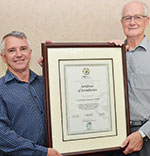
Hytec has become South Africa’s first company to receive full accreditation as a training provider to qualify ‘fluid power fitters’. The company received full accreditation with programme approval from the MerSETA to provide theoretical and practical training for the National Certificate Mechanical Engineering: Fitting (Fluid Power), and the National Certificate Mechanical Engineering: Fitting (Manufacturing, Engineering and Related Industries), both at NQF level II. The National Certificate Mechanical Engineering Level 2 is the first in a learning path of three consecutive qualifications which culminate in a Further Education and Training Certificate: Mechanical engineering, NQF Level 4, within the context of a traditional designated trade specialisation.
There are currently four learners undergoing training at Hytec for the National Certificate: Mechanical Engineering: Fitting (Fluid Power) who, once qualified, will be the first certified fluid power fitters in South Africa trained by a South African training provider. This is an achievement that the South African fluid power industry has been striving to achieve since 2009 when the qualification was originally registered with SAQA.

According to group training manager, Allen van Gent, the importance of the certification cannot be underestimated. “There are numerous mechanical fitters with hydraulics industry experience but it is the formal recognition of the specific training that’s important,” he says. “The scope of training that Hytec is accredited to provide encompasses every aspect that a fluid power fitter needs to know in order to conduct day-to-day activities within the fluid power industry.”
Hytec’s new training facility, due to open in 2018, will have three dedicated training rooms accommodating a combined capacity of 120 people and will provide both theoretical and practical training under one roof. Part of the learning experience will be a state-of-the-art WS290 hydraulic and pneumatic training workstation donated by Bosch Rexroth Germany. The hydraulic power unit, with a load sensing double pump, can accommodate four to six trainees simultaneously. It is perfectly suited for training sessions with respect to on/off, electro, proportional and closed-loop control hydraulics topics and on/off, electro pneumatics and PLCs which incorporate modular mechatronics systems. Hytec will use this for theoretical training and practical simulation to ensure that all learners gain hands-on experience in a controlled, practical learning environment.
The full accreditation and programme approval process dates back to 2006, when SAFPA developed a curriculum for a National Certificate Mechanical Engineering: Fluid Power, a process which took three years to finalise. During the design phase, SAFPA registered the curriculum and associated learning material with SAQA. Unfortunately, post-2009 no learners were registered against the qualification and SAQA deregistered it in 2015. MerSETA then replaced the qualification with the Quality Council for Trades & Occupations (QTCO) Tool Maker Occupational qualification. Subsequently, SAFPA attempted unsuccessfully to reinstate the original qualification as it planned to introduce a pilot programme for the fluid power industry.
SAQA required proof that industry faced a shortage of fluid power fitters and that there would be definite interest in the qualification. During the course of 2016, SAFPA enrolled six learners onto the NQF level II pilot programme administered by TVET College JFa² Technical Training Institute. The college focused on the theoretically driven Core and Fundamental unit standards. However, a company accredited to provide practical training was needed. Hytec, concerned over the existing training gap for fluid power fitters, then got involved.

Thus began the long and convoluted interactions between the relevant stakeholders, all doing their best to get the NQF qualification reinstated as it was prior to it being linked to the QTCO qualification. Hytec and JFa² worked closely with the MerSETA and once SAQA approval had finally been obtained, Hytec employed and registered the learners who had completed theoretical training and wanted to continue with the qualification. After many negotiations and a lot of work carried out by Hytec’s training department, Hytec received full accreditation as a training provider with programme approval.
“We were subsequently informed that, as of 2019, all legacy SAQA qualifications will be realigned or replaced by a QCTO occupational qualification,” van Gent says. “Subsequent to receiving this notification, relevant stakeholders in the fluid power industry are in the process of applying to register a QCTO Qualification: Fluid Power.” Hytec is now awaiting feedback from its submission for registration with the Department of Higher Education.
For more information contact Allen van Gent, Hytec, +27 (0)11 979 4630, [email protected], www.hytecgroup.co.za
| Tel: | +27 11 975 9700 |
| Fax: | +27 11 975 8709 |
| Email: | [email protected] |
| www: | www.boschrexroth.africa |
| Articles: | More information and articles about Hytec South Africa |
© Technews Publishing (Pty) Ltd | All Rights Reserved